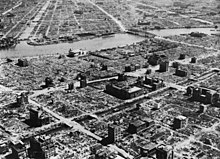Japanese Village (Dugway Proving Ground)
This article includes a list of general references, but it lacks sufficient corresponding inline citations. (February 2010) |



Japanese Village was the nickname for a range of houses constructed in 1943 by the U.S. Army in the Dugway Proving Ground in Utah, roughly 100 kilometers (62 mi) southwest of Salt Lake City.
History
[edit]Dugway was a high-security testing facility for chemical and biological weapons. The purpose of the replicas of Japanese homes, which were repeatedly rebuilt after being intentionally burned down, was to perfect the use of incendiary bombing tactics, the fire bombing of Japanese cities during World War II.
Testing on the Japanese Village at Dugway Proving Ground coincided with the erosion of precision bombing practice in the U.S. Army Air Force and validated civilians as targets of air warfare during World War II. As such, the interiors of Japanese Village contained furnishing (including tables, futon, radios, chests, hibachi stoves, etc.) as found in contemporaneous Japanese housing.[1]
The principal architect for Japanese village was Antonin Raymond who had spent many years building in Japan. Boris Laiming, who had studied fires in Japan, writing a report on the 1923 Tokyo fire, also contributed.[2]
The most successful bomb to come out of the May–September 1943 tests against the mock-up Japanese homes was the napalm-filled M-69 Incendiary cluster bomb. Contenders had been the M-47 (containing coconut oil, rubber, and gasoline) and the M-50 (a blend of magnesium and powdered aluminum and iron oxide). Also tested was the "Bat bomb" a lightweight "bat incendiary" that was attached to live bats.
For the tests B-17 and B-24 bombers were used operating at normal bombing altitude, and the effects on the villages were meticulously recorded.
Popular culture
[edit]The novel The Gods of Heavenly Punishment by Jennifer Cody Epstein contains a fictionalized account of the building and destruction of the Japanese Village.[3]
See also
[edit]Further reading
[edit]- Dylan J. Plung, "The Japanese Village at Dugway Proving Ground: An Unexamined Context to the Firebombing of Japan," Asia-Pacific Journal: Japan Focus, Volume 16, Issue 8, No. 3, April 15, 2018.
- Stewart Halsey Ross, "Strategic bombing by the United States in World War II"
References
[edit]- ^ Plung, Dylan (15 April 2018). "The Japanese Village at Dugway Proving Ground: An Unexamined Context to the Firebombing of Japan". Asia-Pacific Journal: Japan Focus. 16 (8).
- ^ "Historical Testing - Dugway Proving Ground". Archived from the original on 9 May 2010. Retrieved 14 June 2011.
- ^ Epstein, Jennifer Cody (2013). The Gods of Heavenly Punishment: A Novel. New York: W.W. Norton & Company. ISBN 978-0393071573. OCLC 783163654.
External links
[edit]- German-Japanese-Village
- Aerial view of German and Japanese villages, May 27 1943
- Assault on German village
- US Army Bases
- Dugway MIL site on the village (With images of the village)
- Incendiary jelly Time Magazine on M-69
